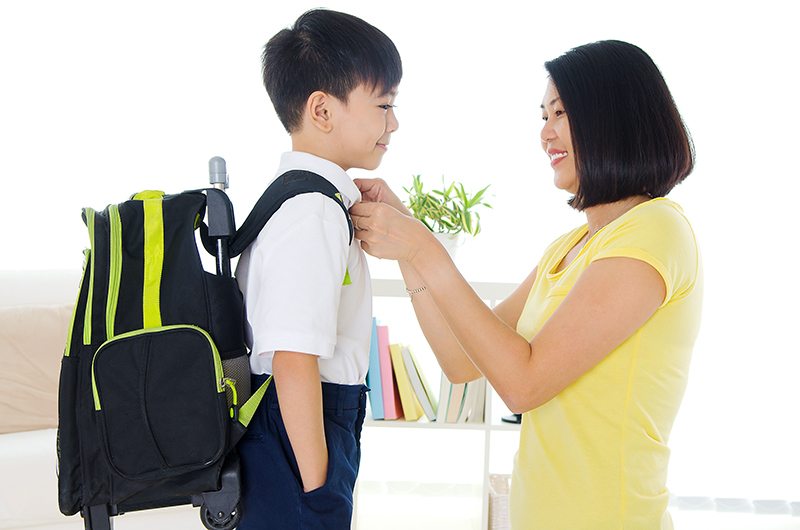Families For Life | Starting School: Enrolling and Preparing Your Child

DID YOU KNOW?
Playing with pasta pieces, especially macaroni, can be an excellent way to boost your child's acquisition of fine motor skills!
READ MORE

Starting school is a big step for your child – and for you too. It helps to plan ahead for enrolment and to start preparing your child for this new phase in her life.
Preparing your child for starting school
Starting school can be a big change for your child – and a big change in your family life too. Although it’s an exciting time, it’s normal to feel a little worried or sad about it. Keeping your worries to yourself and letting your child know that you think he’ll go well at school helps your child feel positive too.
Here are tips to help you and your child feel ready for starting school.
Getting familiar with school
If your child is at a preschool with a school transition programmes, try to make sure your child is at preschool on the days the children visit ‘big school’. If your child isn’t at preschool, visit the school yourselves, or see if the school runs its own transition day. This helps your child get familiar with the grounds, the classroom, the toilets, the water coolers, the noise of the big kids and so on.
Meet your child’s teacher together and give your child an idea of how many children will be in the class. Let your child know that teachers are there to help, and she can ask for help any time.
Explain the basic school rules, like putting up your hand, asking before going to the toilet, listening quietly when you need to, and doing what the teacher asks.
Show your child where the after-school care facilities are, if you’re using them.
Make sure your child knows where you’ll be picking him up.
Practical preparations at home
Get your child to try on the uniform and shoes before the first day, just to make sure everything fits. It’s a good idea to have your child wear new school shoes for a few days before school starts.
Make sure your child has all he needs – bag, stationeries and so on.
Have a practice run with the lunch box to make sure your child can take off the lid. You could even do this before buying the box.
Feelings
Try to organise playdates with other children before the first day of school. It’ll help if your child knows another child from class before school starts.
Give your child lots of love and support. Be excited and enthusiastic about your child starting school. This sends your child the positive message that school is exciting and that she’ll cope and have fun.
Think about how you’ll manage your feelings on the first day. Even if you’re feeling sad or worried, it can help to keep these feelings from your child. Instead, try to see your child off with a happy, confident goodbye – and plan something nice for yourself too, like coffee with a friend.
Read a children’s book about starting school with your child. Reading books about school together can help you talk with your child about his feelings. You could try Starting school by Janet and Allen Ahlberg, or Starting school by Jane Godwin and Anna Walker.
Sometimes it’s helpful to talk to other parents about how you’re feeling. Other parents might also have helpful tips for preparing and starting school.
Starting school: the early weeks
Your child is likely to need a lot of support when school starts. There are some simple things you can do to help these first few weeks go smoothly:
Try to drop off your child at school before the bell goes in the morning. Also pick your child up on time. If you’re late it could make your child feel very anxious.
Try to make after-school time a bit special, with a snack and time for the two of you to chat.
Be patient if your child wants to blurt out every little detail about school, or clams up completely. You could try saying something like, ‘Tell me one good thing about your day’, rather than asking lots of questions.
Try to be flexible with snacks and meals. Your child will probably be very hungry after school. If you give her a small, healthy snack straight after school, it’ll help to keep her going until the next meal.
Don’t expect too much academic progress too soon. If your child is happy and seems to be enjoying school, that’s a real achievement. The rest will come later.
Remember that it’s normal for children to play with lots of different children, and even to play on their own sometimes. It takes a while before they settle into a group of friends.
If your child doesn’t seem to be settling well, or reports teasing or bullying, speak to your child’s classroom teacher.
Your child is likely to be very tired after school for the first few weeks. It’s a good idea to limit after-school activities like swimming lessons for the first term, and stick to a bedtime routine if you can. When you feel your child is coping all right with after-school tiredness, you can think about setting up a playdate with one of his new classmates.
© raisingchildren.net.au, translated and adapted with permission
Explore more